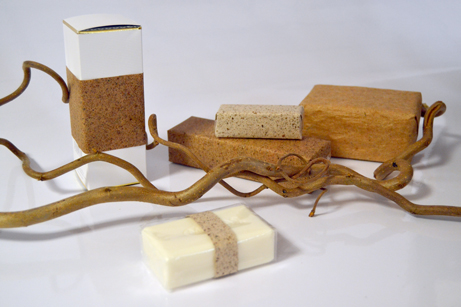 |
||||||||
| May 11, 2016 | ||||||||
| Field Report - Improving Reel Turnups |  |
|||||||
|
· Subscribe to Ahead of the Curve · Newsletters · Ahead of the Curve archived issues · Contact the Editor
|
Coffee, tea, or… innovation A paper leaf that dissolves into a cup of tea—a soothing skin treatment in a disposable mask—a confection tucked into a cocoa wrapper. These imaginative products aren’t from a fantasy novel; they were born in a new type of fiber-focused laboratory. These creations represent the innovative spirit that LeafLAB, a design company operating within Schweitzer-Mauduit International (SWM), is hoping to capture in its alternative-fiber products. The mission of the LeafLAB team is to use revolutionary fiber-recycling technologies to bring new botanical product concepts to life. SWM has been producing paper and packaging products for more than 400 years—since 1545, when the company’s first paper mill began operations in Provence, France. Now headquartered in Alpharetta, Georgia, USA, the company has positioned itself as a global leader of engineered solutions for various industries and employs approximately 3,000 people worldwide. SWM’s long history hasn’t kept the company from exploring innovations that seem almost futuristic in application and design; that’s where LeafLAB comes in. The company calls LeafLAB a “think tank” within SWM, with a dedicated cross-functional team of experts (in research and development, manufacturing, sales, and support) located in Le Mans, France and Ancram, New York. With an exclusive focus on the transformation of botanical fibers, LeafLAB specializes in cutting-edge fiber extraction and engineering processes. The goal is to create new botanical solutions with industrial applications in markets including beverages, packaging, and cosmetics. In late 2015, LeafLAB began marketing its first products: Cocoa PaperTM and Cocoa fiber, created from cocoa shells (the delicate skin surrounding cocoa beans.) Cocoa Paper has food contact certification and, according to LeafLAB, is the first natural paper especially imagined for chocolate and confectionery manufacturers, as well as specialized converters. Because it uses the cocoa shells, which have typically been considered a by-product, Cocoa Paper can be considered as an “eco-efficient” alternative to classic packaging. SWM reports that, using its botanical reconstitution technique, LeafLAB has created a range of other plant fiber-based papers using a variety of plant fibers often considered botanical by-products, such as tea leaves, coffee chaffs, spent grain, wine pomace, and coconut shell. Product ideas range from food packaging to teabags, cosmetic masks and tissues. LeafLAB innovations include several main product areas, including: Packaging from plant-based paper: Well-known in both unprocessed and processed forms, coffee, tea and cocoa are now being used in new, non-food applications thanks to LeafLAB’s innovative formats for products it calls Cocoa Paper, Tea Paper, and Coffee Paper. LeafLAB teams have created its original plant-based paper products with recycled plant by-products extracted from coffee and cocoa beans. The company calls them “multi-sensory products” that offer stand-out new packaging solutions including wrapping paper for chocolate, cakes or candy; or coffee capsule filters—bags and cups for hot or cold drinks. Botanical Fibers: LeafLAB teams create botanical fibers—used as a pulp component designed for paper, cardboard and non-woven product manufacturers—made of plant by-products from cocoa, tea, coffee, beer, wine, and coconut. Beverage (InFuzeTM): InFuze is a distinctive, patented material made from teas and herbs. According to the company, it offers new performance and product innovation possibilities to hot and cold infusion applications. InFuze was designed to provide beverage industry professionals with new tea formats for hot or cold infusion, or as part of the blend in traditional tea bags. With black, green or flavored tea, either pure or combined with other plant varieties, InFuze lets manufacturers choose the ingredients and formats (such as sticks or drops) that they want. LeafLAB says that InFuze offers “endless possibilities” as well as measurable benefits in terms of usage and savings. Advantages include significantly faster hot and cold infusion times compared to conventional brew materials, eliminating the need for paper, and enhancing the taste. Cosmetic: LeafLAB develops specific botanical solutions and materials for the cosmetic industry as an extension of the company's commitment to creating natural materials. With its plant fiber transformation technologies, LeafLAB creates a variety of biodegradable materials that store and release active ingredients for use in products like face masks, skin cleansing sheets, and beauty patches for the eyes or body. The company reports that LeafLAB is actively developing world-wide commercial and technical partnerships to develop or co-develop new botanical solutions into diversified sectors including beverages, packaging, and cosmetics. “The work that we’re doing with LeafLAB is genuinely revolutionary,” says Fabrice Werner, vice president of SWM Advanced Fibers and Materials. “Combined with patented technologies, our expertise enables us to take fibers from a variety of plants and transform them into biologically rich products.” Visit www.leaflab.com to learn more. Now that you are Ahead of the Curve, stay there by joining TAPPI.
For a modest investment of $174, receive more than US$ 1000 in benefits in return. |
|||||||
 |
||||||||


